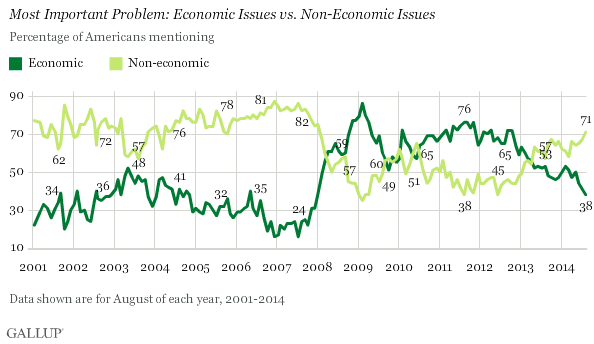WASHINGTON, D.C. -- Americans say the government, immigration, and the economy in general are the most important problems currently facing the country. Mentions of government and the economy have been at the top of the list since the beginning of the year, while mentions of immigration rose sharply in July, in response to the crisis at the U.S.-Mexico border, and remain high this month.

To address the immigration issue, President Barack Obama requested an emergency appropriation of $3.7 billion, which Republicans in Congress rejected. The Republican-led U.S. House of Representatives passed two immigration bills before members left for their August recess, but the bills have little chance of passing the Democratic-controlled Senate or being signed into law by the president. The government's failure to act on immigration before the recess likely angered Americans who say immigration is the most important issue, and may be one reason mentions of immigration are elevated for a second month.
Twelve percent mention jobs or unemployment as the top problem, down from earlier this year. As 2014 began, jobs, the economy in general, dissatisfaction with government, and healthcare were the problems Americans mentioned most often. But last month, mentions of immigration surged 12 percentage points while slightly fewer Americans cited jobs, government, and healthcare.
In the Aug. 7-10 poll, mentions of immigration, the economy, and jobs as the most important problem each dipped slightly.

More Americans said foreign policy was the most important problem facing the U.S. in August than said this in July, possibly in response to new U.S. military involvement in Iraq, as well as the ongoing fighting between the Israelis and Palestinians and the Russia-Ukraine situation. While the percentage of Americans citing "war" also ticked up slightly, mentions of foreign policy increased by four percentage points between July and August, the largest change seen this month. The increase in international involvement and talks of possible involvement may have led to this rise in mentions of foreign policy as the most important problem.
Seventy-One Percent of Americans Say Non-Economic Issues Most Important
Many more Americans now mention a non-economic issue -- such as dissatisfaction with government, immigration, or ethical and moral decline -- than an economic one as the top problem. This reverses the situation found during much of the recession and its aftermath, when more Americans listed economic issues. The renewed focus on non-economic issues was first evident in May 2013, and the gap between economic and non-economic mentions has now widened to 33 points, with 71% of Americans mentioning non-economic issues and 38% citing economic issues.

Prior to 2008, an era of a generally healthy economy, Americans were also more likely to list non-economic than economic issues. For example, in August 2007, 82% of Americans listed non-economic issues such as the war in Iraq or immigration as the nation's most important problem, while 24% listed economic issues. By August 2008, there was a much more even split, with 59% listing economic issues and 57% non-economic issues.
Implications
Americans have shifted their focus more to non-economic issues as the most important U.S. problem since May 2013. That trend continues this month. Economic issues more frequently received the most mentions from 2008 through 2013, when the U.S. economy was suffering and unemployment was relatively high. However, now that the economy appears to be recovering, as evidenced by positive signals such as a six-year high in Gallup's Job Creation Index and increased consumer spending, non-economic issues such as government and immigration have become greater concerns to Americans.
With the midterm congressional elections approaching, candidates would be wise to pay attention to these shifting priorities. In particular, Congress' lack of action on immigration could become a major issue in the fall campaign. Of course, it is challenging for the two parties to come to agreement during an intense political season, so it is not clear that Congress will address the issue even if its inaction puts some of its members' jobs in jeopardy.
Survey Methods
Results for this Gallup poll are based on telephone interviews conducted Aug. 7-10, 2014, with a random sample of 1,032 adults, aged 18 and older, living in all 50 U.S. states and the District of Columbia.
For results based on the total sample of national adults, the margin of sampling error is ±4 percentage points at the 95% confidence level.
Interviews are conducted with respondents on landline telephones and cellular phones, with interviews conducted in Spanish for respondents who are primarily Spanish-speaking. Each sample of national adults includes a minimum quota of 50% cellphone respondents and 50% landline respondents, with additional minimum quotas by time zone within region. Landline and cellular telephone numbers are selected using random-digit-dial methods. Landline respondents are chosen at random within each household on the basis of which member had the most recent birthday.
Samples are weighted to correct for unequal selection probability, nonresponse, and double coverage of landline and cell users in the two sampling frames. They are also weighted to match the national demographics of gender, age, race, Hispanic ethnicity, education, region, population density, and phone status (cellphone only/landline only/both, and cellphone mostly). Demographic weighting targets are based on the most recent Current Population Survey figures for the aged 18 and older U.S. population. Phone status targets are based on the most recent National Health Interview Survey. Population density targets are based on the most recent U.S. census. All reported margins of sampling error include the computed design effects for weighting.
In addition to sampling error, question wording and practical difficulties in conducting surveys can introduce error or bias into the findings of public opinion polls.
View survey methodology, complete question responses, and trends.
For more details on Gallup's polling methodology, visit www.gallup.com.
